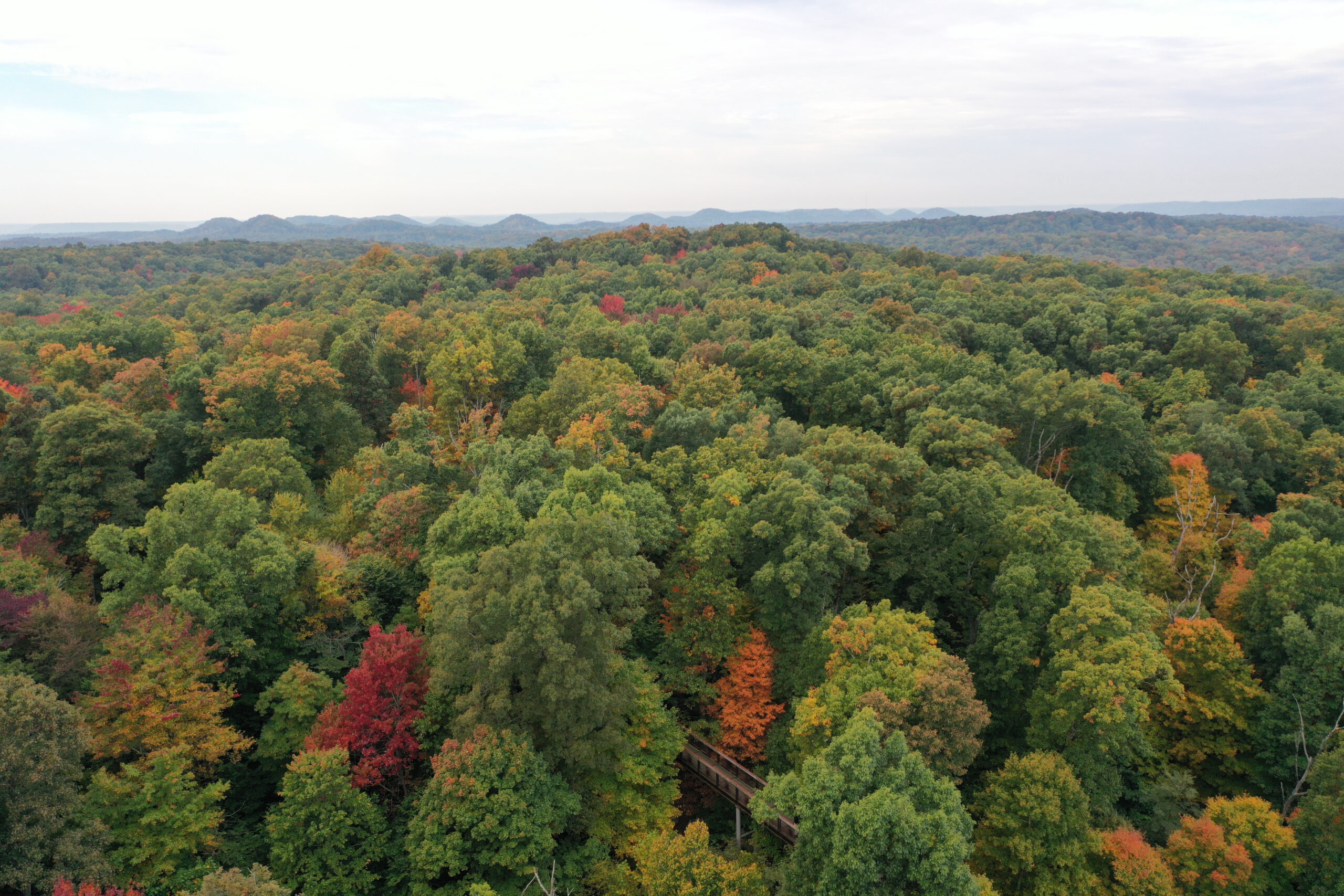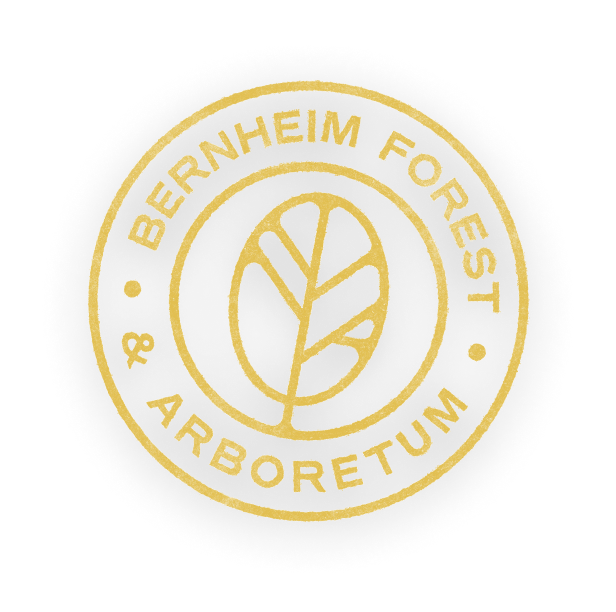By Olivia Belk
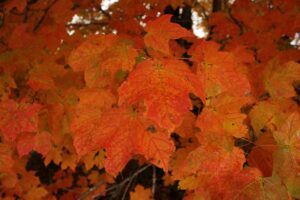 As I sit at my desk writing this blog, I hear an endless flurry of swishes and crunches outside, and each time the wind blows, I could swear it was raining. Yet the sun is bright and colors swim on the street below as the breeze carries yellow, red, and brown leaves aimlessly through the air. In addition to the sounds of the wind and its passengers, there are other auditory hints of the season’s end: squirrels crunching and chattering in the underbrush, birds whistling out their epic conclusions to their season of songs, and flocks of geese honking overhead as they head to their winter retreats. It is as if the natural world knows that the quiet of the cold months is nearly upon us and is making constant noise to celebrate the end of a successful year. The vibrant colors of autumn are beginning to fade, and trees are shedding their leaves in preparation for winter.
As I sit at my desk writing this blog, I hear an endless flurry of swishes and crunches outside, and each time the wind blows, I could swear it was raining. Yet the sun is bright and colors swim on the street below as the breeze carries yellow, red, and brown leaves aimlessly through the air. In addition to the sounds of the wind and its passengers, there are other auditory hints of the season’s end: squirrels crunching and chattering in the underbrush, birds whistling out their epic conclusions to their season of songs, and flocks of geese honking overhead as they head to their winter retreats. It is as if the natural world knows that the quiet of the cold months is nearly upon us and is making constant noise to celebrate the end of a successful year. The vibrant colors of autumn are beginning to fade, and trees are shedding their leaves in preparation for winter.
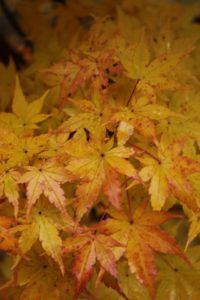 The many natural sounds I hear are often pierced by the overwhelming droning of leaf blowers, corralling the leaves into piles to be placed into bags. These bags are often sent off to be composted, but according to the EPA, in 2017 alone, over 8.7 million tons of yard trimmings wound up in landfills.
The many natural sounds I hear are often pierced by the overwhelming droning of leaf blowers, corralling the leaves into piles to be placed into bags. These bags are often sent off to be composted, but according to the EPA, in 2017 alone, over 8.7 million tons of yard trimmings wound up in landfills.
To some, an appealing yard is one that is free of leaves and debris. Suburban neighborhoods are made up of one wide green lawn of neatly trimmed grass after another, with the occasional stand out house that features an abundant garden rather than grass. But if you think about the lack of trees, tall grasses, shrubbery, and pollinator plants in our home landscapes, it becomes quite clear that our green lawns do not provide much in the way of habitat to the wild world we hold dear. I am not here to ask everyone to greatly change their lawns. In fact, my request is quite easy and saves you a bit of time, effort, and money.
Simply leave your leaves.
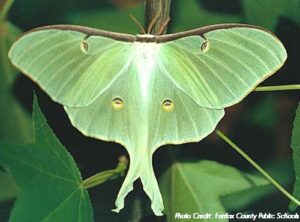 Leaves remaining untouched on the ground is quite a natural thing. There is no one raking the leaves in a forest or blowing them into neat piles to be carried elsewhere. They go where the wind beckons, and leafy groundcover is vital to many critters that we love to see in our landscapes. Animals such as butterflies, salamanders, beneficial insects, chipmunks, toads, earthworms, and many others rely on fallen leaves to provide shelter through the winter. A box turtle will burrow under leaves and soil to hibernate, and large caterpillars such as the Luna Moth will wrap cocoons from fallen leaves to stay cozy until warm months return. By removing leaves from your yard, you are reducing the wildlife you will see there. Raking up the insects within the leaf litter not only means fewer butterflies and moths, but fewer birds who would otherwise visit in the spring to find a snack. With habitats shrinking across the country, your yard is as important as ever.
Leaves remaining untouched on the ground is quite a natural thing. There is no one raking the leaves in a forest or blowing them into neat piles to be carried elsewhere. They go where the wind beckons, and leafy groundcover is vital to many critters that we love to see in our landscapes. Animals such as butterflies, salamanders, beneficial insects, chipmunks, toads, earthworms, and many others rely on fallen leaves to provide shelter through the winter. A box turtle will burrow under leaves and soil to hibernate, and large caterpillars such as the Luna Moth will wrap cocoons from fallen leaves to stay cozy until warm months return. By removing leaves from your yard, you are reducing the wildlife you will see there. Raking up the insects within the leaf litter not only means fewer butterflies and moths, but fewer birds who would otherwise visit in the spring to find a snack. With habitats shrinking across the country, your yard is as important as ever.
In addition to providing habitat, allowing leaves to decompose on your lawn allows organic matter and nutrients to return to the soil, which means you need less fertilizer. Nature makes sure nothing is wasted in its many cycles, and decomposing leaves are just as important as the ones still on the trees. In addition, fallen leaves also cover up vulnerable root systems, preserve soil moisture, and suppress weeds. The benefits of leaving your leaves are numerous, both to yourself as a homeowner and to the life around you.
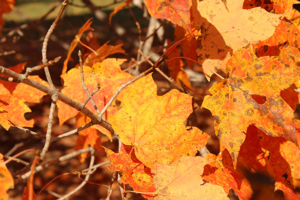 Want to keep your yard clear but still provide habitat for animals? Rather than bagging leaves up, push them into a corner. Have a garden? Compost your leaves to be used next season. Better yet, drop them into flower beds rather than using mulch, as the leaves will protect your plants while providing natural fertilizer. If you have the option, you can rake your front yard while allowing your backyard to remain covered. Feeling ambitious? Create a brush shelter where you can stack leaves, logs, and branches for a variety of critters to use. There are many possibilities! As always, when in doubt, consider the natural processes that would occur without human intervention. These are usually what is best for the landscape and the life within it.
Want to keep your yard clear but still provide habitat for animals? Rather than bagging leaves up, push them into a corner. Have a garden? Compost your leaves to be used next season. Better yet, drop them into flower beds rather than using mulch, as the leaves will protect your plants while providing natural fertilizer. If you have the option, you can rake your front yard while allowing your backyard to remain covered. Feeling ambitious? Create a brush shelter where you can stack leaves, logs, and branches for a variety of critters to use. There are many possibilities! As always, when in doubt, consider the natural processes that would occur without human intervention. These are usually what is best for the landscape and the life within it.
So rather than cleaning up your yard today, I encourage you to simply leave it be. I assure you, nature will be grateful, and your future self will appreciate the saved time, energy, and money.
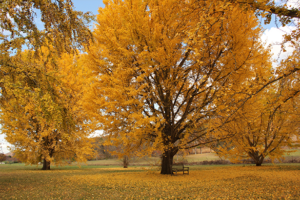 Instead, sit outside, breathe in the scents of fall, and watch the squirrels scamper to and fro. Listen to the rustling of the leaves as they dance in the breeze and walk barefoot to feel those that have fallen into your yard crunch beneath your toes. Relish these last few days of warm weather before the cold sets in, and winter’s calm quiet allows the world to recharge.
Instead, sit outside, breathe in the scents of fall, and watch the squirrels scamper to and fro. Listen to the rustling of the leaves as they dance in the breeze and walk barefoot to feel those that have fallen into your yard crunch beneath your toes. Relish these last few days of warm weather before the cold sets in, and winter’s calm quiet allows the world to recharge.
